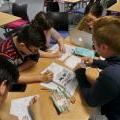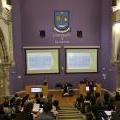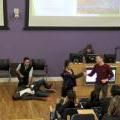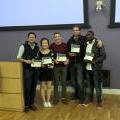U21 Students' Visions of the Future of Digital Cities
This Friday 10th of July 2015, international students attending the U21 Summer School 2015: Cities and Citizens in the Digital Age presented their visions of the future of digital cities.
After ten days of lectures, seminars and practical experiences demonstrating how new technologies can be used to support and improve the vital components of a fully functional city, students synthesized in a future thinking activity their understanding of some of the key themes of the course (such as cities in the digital era, sustainability, citizen engagement, democracy and governance, education and learning, management and planning, community development, social services, digital innovation, energy, mobility, and so on).
The activity consisted on imagining the digital future of a city of their choice: How would this city look like in 2040?
During the plenary session all groups presented their 3 minutes presentations in which they showcased why and how the city of their choice will be one of the most successful cities, in terms of understanding urban complexity and providing a systemic management that uses digital technology and other resources wisely, in order to offer services of high quality to their citizens. The cities that were imagined and the title of the presentations were:
- Securing the Future of Our Citizens (Baltimore)
- Smart City, Happy City (Amsterdam)
- Together We are Glasgow
- Groundbreaking Hong Kong
- Punarjanma (My legacy, my pride, my Kathmandu)
- The Glaswegian Classroom
- Barcelona 25
- "Stockholm sustainability agenda: Transition to a zero-waste city".
- Efficient Edinburgh
- The Future Vancouver Citizen
- Tallinn: The Digital City of the Future
- An environmentally friendly Hong Kong
- Singapore Smart City
All presentations showed a high degree of thinking, imagination and creativity and a big effort of synthesis. Students used a wide range of digital resources and they combined them with other communication techniques.
After all groups’ presentations it followed a great discussion where all proposals were commented and challanged. At the end of the session students and scholars voted for the best piece of work considering the following selection criteria:
- Communication skills and the use of digital technologies;
- Teamwork and synergy among the members of the group;
- Research and reflection on the themes covered in the course;
- Future thinking: the capacity to envision the future of a city;
- Creativity;
- Time management.
The best pieces of work were recognized with the following awards:
- The “People’s Choice Award”, given by the popular student vote, went to Groundbreaking Hong Kong. This proposal presented a vision of Hong Kong with different undergrounds levels, in order to solve mobility problems and to gain public space in the surface.
- The “Most Innovative Vision of the Future City Award”, given by the faculty vote, went to Punarjanma: My legacy, my pride, my Kathmandu. Despite its current state of destruction because of last April earthquake, this group of students envisioned Kathmandu in 2040 as rising from the ruins and emerging as a smarter and developed city in the digital age, by combining the cultural integrity of the people in conjunction with evolving technologies achieved through the incorporation of multiple ‘phoenix centres’ (intelligent buildings that will act as a tangible bridge between culture and technology and which will provide a safe space for the people of Kathmandu to learn and interact with various forms of technology).
- The “U21 Digital Cities Summer School Award” went to: Together We are Glasgow. Due to the three minute time constraint, the group “Green Glasgow” decided to diversify their presentation style using a dramatic interpretation of possible future scenes in the year 2040 with assistance from a PowerPoint presentation. The purpose of the PowerPoint was to give information on the technology that is used in the play as the dramatic scenes unfold. This allowed the team to present how the technology can be used in varied ways in a more engaging manner with individual people. Also, the whole presentation piece was narrated in real time via the system A.I. (Artificial Intelligence) who’s name was “Niles” who lend a voice for the individual actors. The future vision of the city of Glasgow was multifaceted in that it presented a number of solutions that covered all the varied issues that were addressed by the faculty staff and guest lecturers during the U21 Summer School. The main solution set was that all people’s personal data, including financial account, cell phone information, medical records and even up to date medical monitoring will all be stored and accessible in one device that will perform all the aforementioned functions. Also, announcements from the national and local governments would be made directly to the user via an audio and visual manner from “Niles”. The utilization of a centralized data hub will solve the issue of collecting various big data in that it will be processed from one source, and then getting that information to the individuals in an efficient and effective manner. Also, the system will monitor each individual’s health, and in the event of an emergency will contact a medical professional to come.
- Finally, and because of the quality of ideas and projects presented by students, the faculty scholars decided to give an “Honorable Mention Award” to the group Stockholm sustainability agenda: Transition to a zero-waste city.
We want to thank all students for their hard work and effort, enthusiasm and commitment with this learning activity and with the whole Summer School.




 Printer-friendly version
Printer-friendly version- Jesus Granados Sanchez's blog
- Login to post comments
- 303 reads



Recent comments
7 years 44 weeks ago
8 years 16 weeks ago
8 years 24 weeks ago
8 years 37 weeks ago
9 years 31 weeks ago
9 years 31 weeks ago
9 years 31 weeks ago
9 years 33 weeks ago
9 years 34 weeks ago
10 years 14 weeks ago